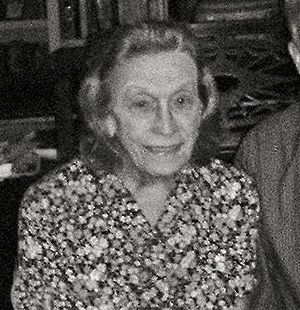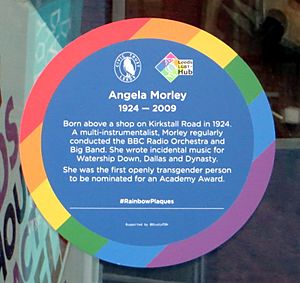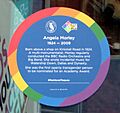Angela Morley facts for kids
Quick facts for kids Angela Morley |
|
|---|---|

Morley in 2004
|
|
| Background information | |
| Born | 10 March 1924 Leeds, West Riding of Yorkshire, England |
| Died | 14 January 2009 (aged 84) Scottsdale, Arizona, U.S. |
| Genres | Easy listening, classical, jazz, big band, film music |
| Occupation(s) | Composer, arranger, orchestrator, conductor |
| Instruments | Alto saxophone, flute, clarinet, bass clarinet, piano |
| Years active | 1940–2008 |
Angela Morley (born March 10, 1924 – died January 14, 2009) was an English composer and conductor. She became well-known to BBC Radio listeners in the 1950s. She learned a lot about composing and arranging from the Canadian composer Robert Farnon. Later in her life, she lived in Scottsdale, Arizona, in the United States.
Angela Morley won three Emmy Awards for her amazing music arrangements. These awards were for "Outstanding Music Direction" in 1985, 1988, and 1990. She won for her work on Christmas in Washington and two TV specials starring Julie Andrews. Morley was also nominated eight times for an Emmy for composing music for TV shows like Dynasty and Dallas.
She was nominated twice for an Academy Award (also known as the Oscars). Her first nomination was for The Little Prince (1974). Her second was for The Slipper and the Rose (1976). Angela Morley was a pioneering artist. She was the first openly trans woman to be nominated for an Academy Award.
Contents
Early Life and Musical Beginnings
Angela Morley was born in Leeds, England, on March 10, 1924. Her birth name was Walter "Wally" Stott. Her father was a watchmaker who played the ukulele-banjo, and her mother was a singer. The family lived above their jewelry shop.
Angela loved dance music from a young age. She started learning the piano when she was eight. After her father passed away in 1933, her family moved, and she stopped piano lessons. She then tried playing the violin at age 10 and the accordion at age 11. Eventually, she chose the clarinet and alto saxophone as her main instruments. She took clarinet lessons and played in her school orchestra.
Morley was mostly self-taught and could read music well. At 15, she left school to tour with Archie's Juvenile Band. She also worked as a projectionist. Her mentor during this time was the pianist Eddie Taylor. She continued to play saxophone in British dance bands during World War II. In 1941, at age 17, she joined the Oscar Rabin Band. With this band, she started writing music arrangements for money. She also made her first recordings. Later, she joined Geraldo's band, which played on BBC Radio often. This gave her a lot of experience arranging music for different types of bands. She also studied music in London with Mátyás Seiber and Walter Goehr.
A Career in Music
Early Work as a Composer and Arranger
At 26, Angela Morley stopped playing in bands. She decided to focus only on writing, composing, and arranging music. She worked in recording, radio, television, and film. She was known for writing "light music" or "easy listening" pieces. Some of her famous works include "Rotten Row" and "A Canadian in Mayfair." She also worked with music libraries and Reader's Digest.
Morley wrote the well-known theme tune for Hancock's Half Hour, which had a famous tuba part. She was also the musical director for The Goon Show from 1952 to 1960. She conducted the BBC Dance Orchestra for the show. She was known for working very quickly. Sometimes, she would write music for The Goon Show on the same day it was recorded. Another short but memorable tune she composed was "Ident Zoom-2" for Associated TeleVision (ATV). This tune was used from 1969 to 1981. By 1953, Morley also started scoring films.
In 1953, Morley became the musical director for the British part of Philips Records. She arranged music and played for their artists. She worked with Frankie Vaughan and Shirley Bassey. She helped Bassey with hit songs like "As I Love You," which reached number one in the UK in 1959. She led an orchestra and a chorale, releasing records under the names "Wally Stott and His Orchestra" and "The Wally Stott Chorale." She also worked with artists like Noël Coward and Dusty Springfield.
In the early 1960s, Morley arranged the United Kingdom's songs for the Eurovision Song Contest twice. She even conducted one of the songs on stage in Luxembourg. She also provided a rhythmic drum solo for the 1960 horror film Peeping Tom. In 1961, she arranged music for an RCA album conducted by Leopold Stokowski. She also arranged and conducted albums for the Italian singer Sergio Franchi.
Some of her other important works before 1972 include the films The Looking Glass War (1970) and When Eight Bells Toll (1971). She took a break from the music and film industry between 1970 and 1972. During this time, she studied clarinet chamber music.
Working as Angela Morley
After 1972, Angela Morley continued her music career using her chosen name, Angela Morley. She was worried about how people would react to her as a trans woman. Because of this, she turned down chances to appear on television. However, she kept working with many of her old colleagues.
One of her first projects after her return was as an orchestrator for Jesus Christ Superstar. She then helped with the music for the film The Little Prince (1974). Her work on this film was nominated for an Academy Award. She traveled to California for the award ceremony.
Morley was also the composer, conductor, arranger, and orchestrator for the film The Slipper and the Rose: The Story of Cinderella (1976). She was nominated for another Academy Award for this film. Later, she wrote most of the music for the animated film Watership Down (1978). She had to work very quickly on this project. Around this time, she was a regular guest conductor for the BBC Radio Orchestra and BBC Big Band.
Work in the United States
After Watership Down was a success, Morley lived in Brentwood, Los Angeles for a while. She started working for Warner Bros.. In 1979, she moved permanently to Los Angeles. She began working mostly on American television soundtracks. These included music for Dynasty, Dallas, Cagney & Lacey, Wonder Woman, and Falcon Crest. She worked with big companies like Warner Bros., Paramount Pictures, and Universal Pictures.
Angela Morley also worked with the famous composer John Williams throughout the 1970s and 1980s. She arranged music for the Boston Pops Orchestra under his direction. She also worked on famous films like Star Wars, Superman, The Empire Strikes Back, E.T. the Extra-Terrestrial, Hook, Home Alone, and Schindler's List. She also worked with other great musicians like André Previn and Miklós Rózsa. Later, she worked with soloists like Yo-Yo Ma and Itzhak Perlman. She was nominated for six Emmy Awards for composing and won three times for music direction.
Morley continued to work in television until 1990. In 1994, she moved to Scottsdale, Arizona. There, she recorded two CDs with the John Wilson Orchestra. She also taught about film scoring at the University of Southern California. Her last film work was for the Disney movie The Hunchback of Notre Dame II in 2002.
Personal Life
Angela Morley was a trans woman. She began living openly as a woman in 1970, when she was 46 years old. She chose the new last name Morley because it was her grandmother's maiden name.
Morley was married twice. Her first wife was Beryl Stott, a singer. Angela met Christine Parker, also a singer, in London, and they married on June 1, 1970.
The couple moved to Los Angeles in 1979. They later moved to Scottsdale, Arizona in 1994. Angela Morley passed away in Scottsdale on January 14, 2009, at the age of 84. She died from complications of a fall and a heart attack.
Morley had two children with her first wife: a daughter, Helen (who passed away before her), and a son, Bryan. She also had grandchildren and great-grandchildren.
Angela Morley had many friends in the music world. She was good friends with Max Geldray and Herbert W. Spencer.
Legacy and Musical Style
Many musicians admired Angela Morley's talent. Arranger Tony Osborne said she was "at the top of the range." Scott Walker compared working with Morley to working with Frederick Delius.
In 2015, BBC Radio 4 made a radio drama about Morley called 1977. This play was about how Morley had to quickly finish the music for the film Watership Down.
Angela Morley's work was influenced by many types of music. She played in British dance bands and composed a lot of "light music" and "easy listening." She also wrote film scores and television soundtracks. While some people didn't take light music seriously back then, it was very important for film music.
Beyond light music, Morley worked with many different artists. She produced her own recordings, from Christmas music to show tunes. Later, she focused on orchestral, classical, and choral arrangements.
Morley felt that new technology, like tape recording and stereophonic sound, changed music. She said that hearing her film scores in cinemas became "absolute torture" because the sound quality wasn't as good as in other music. Still, she continued to work in film until 2002.
What Made Her Music Special
Her music for The Goon Show had a "jazz flavor," which was different from other comedy shows at the time. From her early works, Morley used instruments to represent characters. For example, the tuba notes in the Hancock's Half Hour theme represented Tony Hancock. She also liked to end her songs with "big notes" instead of fading out.
Her film scores are known for her "mastery of orchestration" and her ability to create different "moods and atmospheres." This was clear in films like The Slipper and the Rose and Watership Down. For Watership Down, Morley created a special theme for the character Kehaar. This theme combined classical, swing, jazz, and light music styles. It showed her amazing skill in blending different genres.
Awards and Honours
Awards
- 1985: 37th Primetime Emmy Awards - Primetime Emmy Award for Outstanding Music Direction for Christmas in Washington
- 1988: 40th Primetime Emmy Awards - Primetime Emmy Award for Outstanding Music Direction for Julie Andrews: The Sound of Christmas
- 1990: 42nd Primetime Emmy Awards - Primetime Emmy Award for Outstanding Music Direction for Julie Andrews in Concert (Great Performances)
Nominations
- 1975: 47th Academy Awards - Best Original Song Score and Adaptation for The Little Prince
- 1978: 50th Academy Awards - Best Original Song Score and Its Adaptation or Adaptation Score for The Slipper and the Rose: The Story of Cinderella
- 1980: 32nd Primetime Emmy Awards - Primetime Emmy Award for Outstanding Music Direction for The Big Show episode "Steve Lawrence and Don Rickles"
- 1984: 36th Primetime Emmy Awards - Primetime Emmy Award for Outstanding Music Composition for a Series for Emerald Point N.A.S. episode "The Homecoming"
- 1985: 37th Primetime Emmy Awards - Primetime Emmy Award for Outstanding Music Composition for a Series for Dynasty episode "Triangles"
- 1986: 38th Primetime Emmy Awards - Primetime Emmy Award for Outstanding Music Composition for a Series for Dynasty episode "The Subpoenas"
- 1987: 39th Primetime Emmy Awards - Primetime Emmy Award for Outstanding Music Composition for a Series for Dallas episode "A Death in the Family"
- 1987: 39th Primetime Emmy Awards - Primetime Emmy Award for Outstanding Music Direction for Liberty Weekend: Opening Ceremonies
- 1988: 40th Primetime Emmy Awards - Primetime Emmy Award for Outstanding Music Composition for a Series for Dallas episode "Hustling"
- 1989: 41st Primetime Emmy Awards - Primetime Emmy Award for Outstanding Music Composition for a Series for Blue Skies episode "The White Horse"
Images for kids
See also
 In Spanish: Angela Morley para niños
In Spanish: Angela Morley para niños
 | Misty Copeland |
 | Raven Wilkinson |
 | Debra Austin |
 | Aesha Ash |



